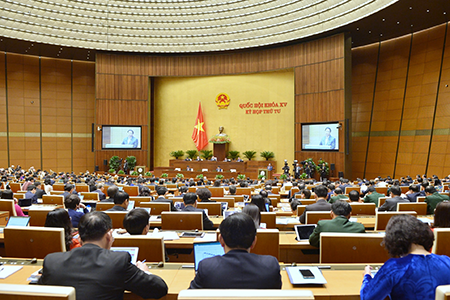Given the economic recovery in 2022, the Vietnamese Government has set a 6.5 percent target for gross domestic product (GDP) growth in 2023, paving the way for the country to fulfill its five-year socioeconomic development plan for the 2021-2025 period.

The ongoing fourth session of the 15th National Assembly
Targets exceeded
Reporting to the fourth session of the 15th National Assembly on the results of the 2022 socioeconomic development plan and projections for 2023, Prime Minister Pham Minh Chinh said that GDP grew 8.83 percent in the first nine months and annual GDP growth is expected to reach about eight percent, with 14 among 15 targets to be achieved or exceeded.
Macroeconomic stability has been maintained with inflation under control. Economic growth has recovered, ensuring major balances despite numerous difficulties. The consumer price index (CPI) grew 2.73 percent in the first nine months and is predicted to reach a four percent rise for the year. The monetary market, as well as the average interest and foreign exchange rates, has been relatively stable. Credit growth in the first nine months reached about 11 percent with most loans used for production and trade purposes. “Economic recovery has been seen in most localities, some of them have achieved high economic growth,” the PM added.
6.5 percent set for 2023
PM Pham Minh Chinh put emphasis on the heavy tasks of the rest of 2022 and in 2023. From now to the end of 2022, he asked sectors and localities to continue effective implementation of synchronous measures in all fields, focusing on preventing COVID-19 spread and other epidemics. The PM urged efforts to surmount shortages of medicines and medical materials and equipment. “The interest and foreign exchange rates should be managed in a flexible manner to ensure stable operations of the monetary and banking systems. Decisive measures should be taken to accelerate public investment disbursement, the implementation of the economic recovery and development program, and three national target programs. It is also necessary to speed up the preparation, assessment and approval of plans,” the PM noted.

Given the economic recovery in 2022, the government has set its GDP growth target for 2023 at 6.5 percent, CPI growth of 4.5 percent, labor productivity growth of 5-6 percent, unemployment rate in urban areas under four percent, and multidimensional poverty rate decline of 1-1.5 percent.
PM Chinh said complicated political, security and socioeconomic changes are expected next year in the global situation, with slower growth and risk of recession, as well as increasing financial, monetary, public debt, energy, food and information security risks.
The Vietnamese economy continues to face challenges, including inflation pressure, increased foreign exchange and interest rates, growing production costs, and shrinking major and traditional import-export markets. Other challenges include epidemics, climate change and natural disasters.\
The PM emphasized that the interest and foreign exchange rates should be flexibly managed to ensure sufficient credit supply for the economy, prioritizing production, trade and sectors that create a driving force for economic growth. Favorable conditions should be created for people and businesses to access loans, while at the same time tightening control over high-risk credit. The PM highlighted the importance of stable financial and monetary markets, enhanced credit quality, restructuring of inefficient credit institutions, and dealing with bad debts and loss-making projects.
Along with promoting exports to achieve a sustainable trade surplus, Chinh also stressed the importance of developing the domestic market, managing the prices of electricity, petroleum and other essential commodities and services. Efforts to prevent smuggling and fraudulent trade should be increased, the PM added.
The National Assembly’s Economic Committee has asked the government to keep a close watch on global and domestic prices of petroleum, propose timely and suitable adjustments to excise tax and value added tax on petroleum, and consider the exemption/reduction of transport fees and charges to support businesses in the context of high energy costs.
Quynh Nga & Lan Anh
Source: VEN








